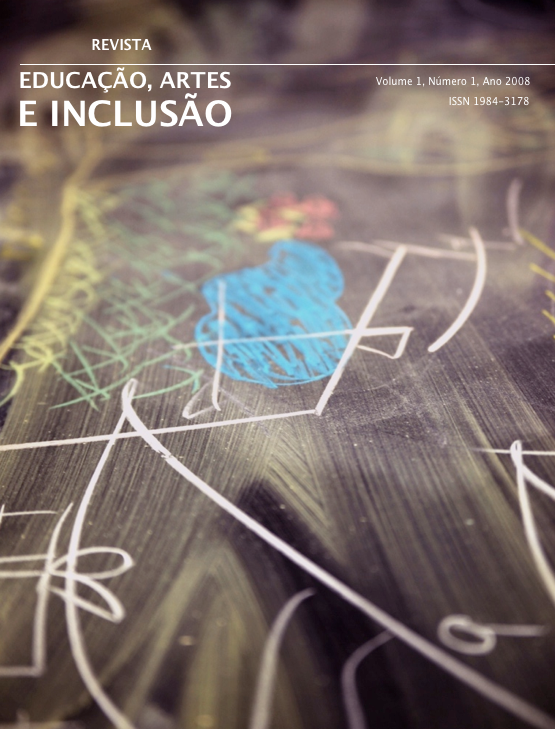A FORMAÇÃO ESTÉTICA DO PROFESSOR: CONCEITOS DE ARTES VISUAIS
Abstract
Neste trabalho, faz-se uma reflexão sobre uma pesquisa que envolveu uma experiência de formação estética de um grupo de doze professoras. Desenvolvida por meio de ateliês, esta formação visava proporcionar às cursistas a possibilidade de desenvolver a capacidade de apreciação e sensibilização estética por meio do contato com expressões artísticas. Também objetivava investigar como a educação estética se forma no ser humano e se essas experiências proporcionam mudanças em aspectos pessoais e profissionais das professoras envolvidas. Salienta-se que, além das artes visuais, as professoras vivenciaram ateliês de literatura, de música e de artes cênicas. Abordar-se-á, neste texto, a análise de um momento dessa experiência, no qual o enfoque foram as artes visuais. Em outras palavras, trata-se de um instrumento de avaliação na forma de um questionário, aplicado no final do primeiro semestre de 2006. Por meio desse questionário, procuraram-se indicadores que demonstrassem se as experiências vivenciadas nos ateliês produziram mudanças, individuais ou coletivas, bem como que demonstrassem como ocorreu, no grupo pesquisado, o processo de formação do sentido estético nas seguintes dimensões: cognição, afetividade e imaginação. A intenção não é esgotar a temática, mas apontar indícios de que as experiências vivenciadas nos ateliês produziram, nas professoras, um movimento no sentido de provocar mudanças pessoais e profissionais.
Palavras-Chave: Estética; Formação de Professores; Artes Visuais.
Abstract: Teachers’ aesthetic training: concepts on visual arts. Considerations on research which comprises experience in aesthetic training of twelve teachers are provided. Training was developed through ateliers and aimed at developing appreciation and aesthetic sensitiveness in the trainees through their contact with artistic expressions. The manner aesthetic education is constructed in humans and whether such experiences provide changes in personal and professional life of the teachers involved were also discussed. It should be highlighted that, besides discussions on visual art, the teachers experienced discussions on literature, music and scenic arts. Paper deals with an instance of such an experience in which the visual arts are focused. A questionnaire, taken as an evaluation tool, filled at the end of the first semester of 2006, showed whether experiences in the ateliers had produced any individual or collective changes and the manner the process of the aesthetic sense occurred in the group according to aspects involving cognition, affectivity and imagination. Although the theme was not discussed to exhaustion, it aimed at showing whether experiences at the ateliers produced personal and professional transformations in the teachers.
Key-Words: Aesthetics; Teachers’ Training; Visual Arts.
Downloads
Downloads
Published
How to Cite
Issue
Section
License
Copyright Statement
The Educação, Artes e Inclusão is a journal that follows the Free Access Policy. The articles published by the journal are free of charge, intended for educational and non-commercial applications. The articles whose authors are identified represent the expression from the point of view of their authors and not the official position of the Educação, Artes e Inclusão Journal or the Educação, Artes e Inclusão Research Group.
Authors who publish in this journal agree to the following terms:
(A) Authors retain the copyright and grant the journal the right of first publication, with the work simultaneously licensed under the Creative Commons Attribution License which allows the sharing of the work with acknowledgment of authorship and initial publication in this magazine.
(B) Authors are authorized to take additional contracts separately, for non-exclusive distribution of the version of the work published in this journal (eg publish in institutional repository or as a book chapter), with acknowledgment of authorship and initial publication in this magazine.
(C) This journal provides public access to all of its content, as this allows for greater visibility and scope of published articles and reviews. For more information on this approach, visit the Public Knowledge Project.
This journal is licensed under a Creative Commons Attribution-NonCommercial-ShareAlike 4.0 International License. This license allows others to remix, adapt and create from your work for non-commercial purposes, and although new work must give you due credit and cannot be used for business purposes, users do not have to license such derivative works under the same terms.



